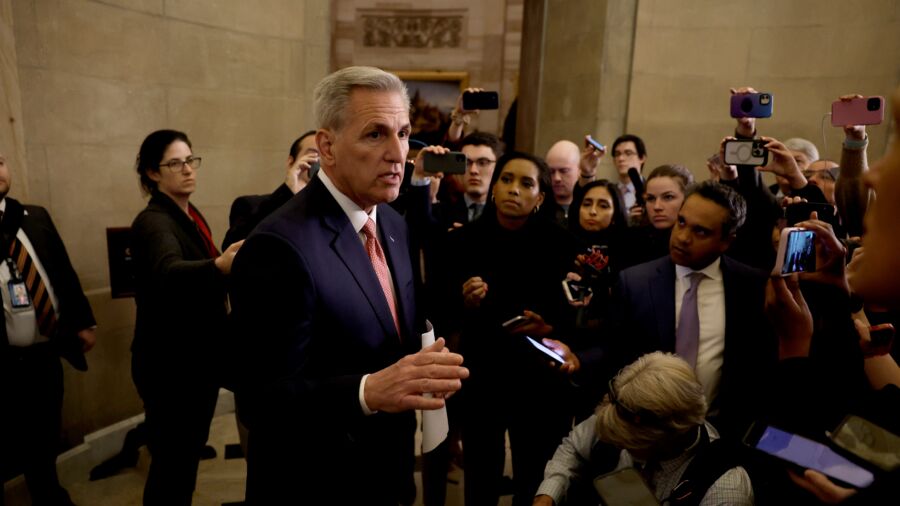Republican House Speaker Kevin McCarthy has endorsed the idea of designating drug cartels as terrorist organizations and embedding at least “some” military forces at the border to facilitate efforts to secure the U.S. border against those cartels.
McCarthy discussed ways to combat the cartel during an interview last month with Breitbart News, which the publication released on Wednesday. Breitbart News discussed border security issues with McCarthy in the days after a group of four U.S. citizens were kidnapped, two of whom were killed in the northern Mexican state of Tamaulipas.
When Breitbart News host Matthew Boyle asked McCarthy about the idea of designating cartel organizations as foreign terrorist organizations, the House speaker replied, “I think you have to designate them.”
“You look what has gone on. These cartels are making billions of dollars human trafficking, right?” McCarthy added. “But they’re using weapons, they’re shooting. We’ve watched in broad daylight what they would do with no respect for life or for Americans.”
Boyle then raised the idea of the U.S. military being deployed in some way against the cartel, noting that former President Donald Trump had already endorsed the idea of using U.S. military forces to combat the cartels “just as we took down ISIS and the ISIS caliphate.”
“I’ve met with the border agents many times. I think we’re going to have to embed some military to allow that technology to help secure it,” McCarthy told Boyle.
The Trump administration did deploy National Guard troops at the border during his presidency, and those troops provided aviation, engineering, surveillance, communications, vehicle maintenance, and logistical support. National Guard troop deployments have continued at the border in the years since.
It was not immediately clear how the roles of U.S. military personnel at the southern border might change under McCarthy’s embedding proposal. NTD News reached out to McCarthy’s office for comment but did not receive a response before this article was published.
Action in Congress
In January, Reps. Dan Crenshaw (R-Texas) and Mike Waltz (R-Fla.) introduced legislation calling for an authorization for the use of military force (AUMF) to allow the U.S. military to target Mexican drug cartels facilitating drug trafficking into the United States.
“The cartels are at war with us—poisoning more than 80,000 Americans with fentanyl every year, creating a crisis at our border, and turning Mexico into a failed narco-state,” Crenshaw, a retired U.S. Navy SEAL, said upon introducing the AUMF legislation.
“It’s time we directly target them. My legislation will put us at war with the cartels by authorizing the use of military force against the cartels. We cannot allow heavily armed and deadly cartels to destabilize Mexico and import people and drugs into the United States. We must start treating them like ISIS—because that is who they are.”
Waltz, a U.S. Army Special Forces Green Beret and colonel in the Florida Army National Guard, said, “Not only are these paramilitary transnational criminal organizations responsible for killing an unprecedented number of Americans, but [they] are actively undermining our sovereignty by destabilizing our border and waging war against U.S. law enforcement and the Mexican military.”
Waltz said the AUMF would give President Joe Biden “sophisticated military cyber, intelligence, and surveillance resources to disrupt cartel operations.”
Mexican President Andres Manuel Lopez Obrador has condemned proposals for allowing U.S. military action against the cartels.
“We are not going to permit any foreign government to intervene in our territory, much less that a government’s armed forces intervene,” Lopez Obrador said in March as discussions about cartel violence peaked.
The Republican-controlled House has yet to take Crenshaw and Waltz’s bill up for a vote in the three months since its introduction.
Reuters contributed to this article.

